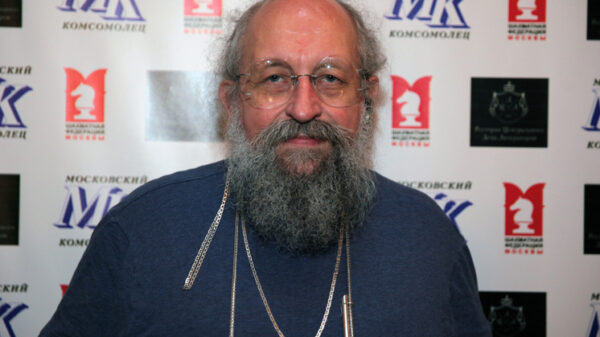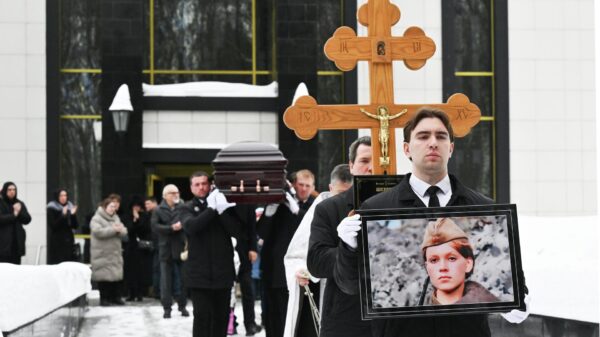 Kirsty Wark at the Newsnight desk in 1995. Photo: Jeff Overs/Getty
Kirsty Wark at the Newsnight desk in 1995. Photo: Jeff Overs/Getty
Here's the question: what is Newsnight for? Here's another question: who is Newsnight for? These are questions worth asking because it's not the first time the future of the BBC's long-running late-night current affairs show has been in doubt. Kirsty Wark, the program's most famous presenter, has announced she will be leaving the program after the next general election. The announcement follows closely on the heels of Newsnight editor Stuart McClean's decision to jump ship, and both come amid rumors of significant budget cuts for the programme, which has long been described as one of the BBC's «flagships».
Flagship or not, Newsnight is no longer a sacred cow. A program that not so long ago boasted of being an «agenda-setter» now appears to be firmly in the sights of the Corporation's cost-cutting accountants. And it marks a significant change in the BBC's internal culture; Times have changed and Newsnight must finally change with them. We will return to the question of who this program is intended for later, but to answer the first question, it is worth remembering why and when it began.
It was 1980, and politics suddenly became interesting. After the «managed decline» of the 1970s, a consensus shared by both major parties, Thatcher began to shake things up. BBC political coverage in the 60s and 70s was very different to what we are used to now. First of all, there was much less of it, and what there was was much less confrontational—more respectful, if you will.
It seems strange now, but there was a time when BBC News avoided «controversy»; it sometimes became embroiled in controversies of its own, but the BBC in those days still held to the old-fashioned notion that its news coverage should be very straight forward; “who, what, where and when” in the old journalistic declination; «Why?» often perceived as a question for others.
But this old BBC code caused resentment among a new generation of BBC journalists — a more assertive, more radical breed who wanted the freedom to explore the sexier side of political journalism — predictions, speculation, «analysis» and so on (areas , which naturally and inevitably give journalists more opportunities to express their opinions). Thus Newsnight was born. At first it was a program without a fixed location and a fixed time slot, but despite this shortcoming, it quickly made an impression.
 Jeremy Paxman anchors the evening news in 1990. Photo: Roger Hutchings/Getty
Jeremy Paxman anchors the evening news in 1990. Photo: Roger Hutchings/Getty
He ushered in a new, edgy kind of broadcast journalism — challenging and unafraid of authority, throwing away the piety of the BBC's ktialist journalism of the past. For those with long memories, it was the platform on which men like the late Vincent Hanna left their mark on election reporting that was unlike anything that had come before.
By the late 1980s, Newsnight had become the BBC program that every aspiring BBC journalist wanted to be a part of; it was “cutting-edge” and “bold,” and for anyone who claimed to be well-informed, it was required viewing. For the next 20 years, it was the program that truly “set the agenda” (or, as many would like, “fixed” the agenda). Thanks to its pomp, it was here that many of the BBC's greatest journalistic reputations were built; the likes of Peter Snow, John Tusa, Donald McCormack and Jeremy Paxman took their place in the presenter's chair. But success on television is never permanent.
By the mid-aughts, Newsnight's viewing figures regularly exceeded 800,000; today it is struggling to reach 300,000, and its annual budget of around £13 million is beginning to look very generous for a program representing minority interests. Hence the talk — and I'm sure it's true — that there will be a £5 million cut in the near future, which will mean big changes to what the program has to offer. Investigative journalism has always been one of Newsnight's specialties; films made by reporters, often abroad. But such journalism is expensive and, as former BBC news chief Katie Searle noted, if fewer than 300,000 people see it, why bother?
Kirsty Wark in 2018
In this, Newsnight became a victim of the changing media landscape. Today, fewer of us get our news on “linear television”; people are no longer willing to sit in the evening and watch what the planners serve up. We're much more likely to get our news from a digital platform that's quick and easy and doesn't require us to sit in a chair for 45 minutes late at night. But Newsnight has another big problem: obvious political bias. From the very beginning, the program tilted to the left. It is the brainchild of the 1980s BBC, which subconsciously, if not overtly, saw itself as in opposition to Mrs Thatcher and all her works.
Take Kirsty Wark as an example. I first met her back in the early 1980s when she was working as an associate producer at BBC Scotland. She was very up to date; young, feminine, feminist, confident and, like almost all BBC Scotland staff at the time, very anti-Thatcher. She belonged to the generation of women journalists who embraced “second wave” feminism; The BBC was keen to show that it was open to the advancement of women, so Wark pushed on the open door. Smart, savvy and very well connected, she was also a staunch supporter of the Labor Party. She counted many senior Scottish Labor officials as close friends; the late Donald Dewar was one of them, and Jack McConnell, Scotland's first Labor First Minister, actually holidayed with her and her family. Everything is very cozy.
Wark was a perfect fit for Newsnight, a program whose political biases have become even more apparent in recent years. Who can forget Emily Maitlis' impassioned speech against Dominic Cummings in May 2020? The BBC reprimanded Maitlis for breaking impartiality rules, but in truth she was a serial criminal who used the presenter's chair as a platform to bully her own brand of luxurious left-wing views.

And there were many others on Newsnight's payroll who could barely hide their devotion. People like business editor Paul Mason, a former Trot member but still a supporter of the Marxist Corbyn, who called UKIP voters «rags»; those people who steal your bike.” And Lewis Goodall, the programme's political editor, Labor activist and former researcher at the left-wing Institute for Public Policy Research. Goodall, by the way, left Newsnight at the same time as Maitlis and now works with her on her global news podcast. Fishing flight, etc.
The departures of Maitlis and Goodall were seen by some as a sign that the BBC intends to depoliticize Newsnight, which has become something of a bete noir for Conservatives. But in reality, little has changed. Last week the program featured an interview with former Israeli Prime Minister Ehud Barak by Emir Nader of the BBC Arabic Service. Asked about Israel's bombing strategy, Barak said Hamas deliberately hid command posts in the basement of Al-Shifa Hospital. Nader was incredulous. «We [the BBC] haven't heard about it,» he said, «you're the only ones saying it.»
In fact, this claim has been reported before and widely reported. If Nader did not find out about this from other sources, then it was his fault. Newsnight's coverage of the current conflict is entirely consistent with the general tone of the BBC: always highly skeptical of everything Israel says, rarely delving into the accuracy of Hamas's claims.
 Jeremy Paxman interviews Tony Blair for Newsnight in 2002. Photo: PA
Jeremy Paxman interviews Tony Blair for Newsnight in 2002. Photo: PA
So what should the BBC do with Newsnight? In recent years, the program has done little to dissuade conservatives that it is part of a permanent opposition. But sometimes its results provide a valuable service. Of particular note is Hannah Barnes' investigation into the Tavistock Clinic's Gender Identity Development Service. Her exemplary work on Tavistock brought unpleasant facts to the center of public debate and led to an investigation into GIDS, which is ultimately scheduled to be closed in 2024. Good investigative journalism is a vital public service and the BBC has a responsibility to dedicate resources to it. – but that doesn't mean it needs to be broadcast on Newsnight. There are other channels.
This brings me to my second question: who is Newsnight for? The answer is that the program only serves the needs of a shrinking circle of loyal Guardianistas. Newsnight is produced by left-liberal journalists who follow a left-liberal agenda to serve a small and shrinking left-liberal audience. The BBC must serve everyone equally; Newsnight demonstrates how far the Corporation has strayed from this ideal. Perhaps it's time to give it up and use the money for other purposes.
Are you watching Newsnight? What have you noticed about its decline? Tell us in the comments section below.


























































Свежие комментарии